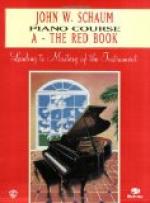“In regard to memorizing. I give no special advice, but counsel the student to employ the way which is easiest and most natural to him. There are three distinct ways of committing music: the Analytic, Photographic, and Muscular. The Analytic memory picks the passage apart and learns just how it is constructed, and why; the Photographic memory can see the veritable picture of the passage before the mind’s eye; while the Muscular memory lets the fingers find the notes. This is not a very reliable method, but some pupils have to learn in this way. Of course the Analytical memory is the best; when the pupil has the mental ability to think music in this way, I strongly recommend it.
“One point I make much of in my teaching, and that is Tone Color, as a distinct factor in musical interpretation. It is not merely a question of using the marks of expression, such as FF, MF, PP, and so on; it is more subtle than that—it is the quality of tone I seek after. Sometimes I work with a pupil for several minutes over a single tone, until he really comprehends what he has to do to produce the right quality of tone, and can remember how he did it. The pedal helps wonderfully, for it is truly the ‘soul of the piano.’
“Some pupils have fancy but no imagination, and vice versa. The terms are not synonymous. Reading poetry helps to develop the aesthetic sense; pictures help also, and nature. I must necessarily take into account the pupil’s trend of temperament while instructing him.
“Interpretative expression is not a positive but a relative quantity. One player’s palette is covered with large blotches of color, and he will paint the picture with bold strokes; another delights in delicate miniature work. Each will conceive the meaning and interpretation of a composition through the lens of his own temperament. I endeavor to stimulate the imagination of the pupil through reading, through knowledge of art, through a comprehension of the correlation of all the arts.
“The musical interpreter has a most difficult, exacting and far-reaching task to perform. An actor plays one part night after night; a painter is occupied for days and weeks with a single picture; a composer is absorbed for the time being on one work only. The pianist, on the other hand, must, during a recital, sweep over the whole gamut of expression: the simple, the pastoral, the pathetic, the passionate, the spiritual—he is called upon to portray every phase of emotion. This seems to me a bigger task than is set before any other class of art-workers. The pianist must be able to render with appropriate sentiment the simplicity and fresh naivete of the earlier classics, Haydn, Mozart; the grandeur of Bach; the heroic measures of Beethoven; the morbid elegance of Chopin; the romanticism of Schumann; the magnificent splendor of Liszt.




